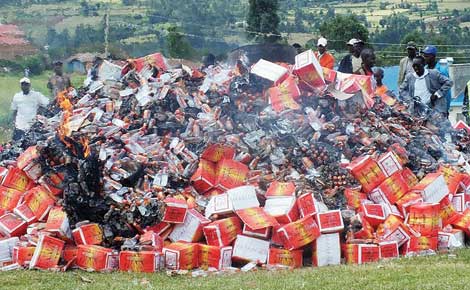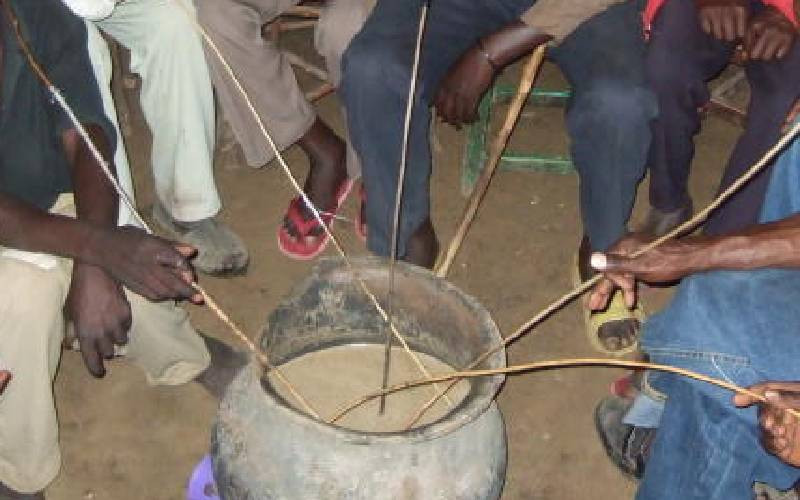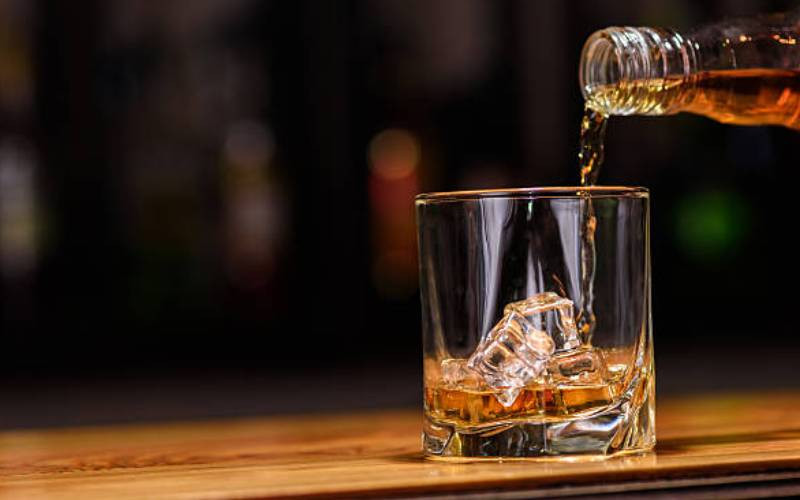 |
|
Bomet County officials, with the help of police officers, destroy illicit brews impounded from various outlets within the town, Thursday. The alcohol was valued at about Sh2.5 million. [Photo: Charles Ngeno/Standard] |
By James Mbaka
Nairobi, Kenya: The Government cracked the whip following this week’s wave of killer brew deaths by closing down a manufacturing company, interdicting top public officials in the liquor and drugs control units and declaring the producers would be charged with murder.
The suspended include the chief executive of the National Authority for the Campaign Against Alcohol and Drug Abuse, Dr William Okedi, 52 officials from the agency and regional police heads.
Anti-Counterfeit Agency chief executive John Akoten was also among those sent home. Interior Cabinet Secretary Joseph ole Lenku also announced the interdiction of five Deputy Commissioners in the affected counties as well as intelligence chiefs and Officers Commanding well as intelligence chiefs and Officers Commanding Police Divisions (OCPDs). The tough-talking cabinet secretary also said that the Kenya Bureau of Standards (Kebs) was under their radar, promising that more heads would roll.
“Kebs is under focus because some of the brands (of the killer brew) had their seal,” announced the CS yesterday. “So far however, our investigations indicate that the seals are fake.”
Speaking after a closed-door meeting with Inspector General of Police David Kimaiyo, Health Cabinet Secretary James Macharia and Nacada Chairman John Mututho, Lenku said Embu County was the most affected with 36 deaths.
The Government also ordered the closure of a company that manufactures the two brands of alcohol found with high levels of an industrial chemical, methanol, which killed 81 people and left more than 160 hospitalised.
Macharia ordered that M/S Comrade Investments Company located along Baba Dogo road in Ruaraka, Nairobi, be shut down for contravening the law governing manufacturing of alcoholic drinks.
This was after results from the samples of the two lethal brands – Sacramento Cane Spirit and Countryman Liquor tested at the Government Chemist – showed high levels of methanol content.
Two brands
“Considering the analysis report and the fact that the two brands with high levels of methanol are from this company, the Ministry under CAP 254 and CAP 242 of the Laws of Kenya hereby orders the closure of M/S Comrade Investments Ltd,” Macharia said in a statement.
The results showed Countryman, which killed 16 people and left 75 hospitalised in Makueni County, contained 100 per cent methanol.
Sacramento, which killed 35 in Embu and left 99 others ill, had 75 per cent of the deadly industrial chemical. A drink for human consumption should not contain methanol.
“In normal circumstances the methanol content should be 0 per cent,” the Government said.
Chief Public Health Officer Dr Kepha Ombacho issued the statement.
Stay informed. Subscribe to our newsletter
The Government said it was analysing other potentially deadly brands in the market manufactured by the same company at the Government Chemist to ascertain methanol levels.
M/S Comrade Investment Company also brews popular low-cost spirits including Hardyman Brandy, Hardyman Gin, Hardyman Vodka, Georges Vodka, Georges Brandy, Rhyneberg Brandy, Pamoja Brandy and Pamoja Gin.
It also emerged that the Government had banned the consumption of four other brands by separate manufacturers for ethanol contents way below the set national standard for gin, which should be 37.5 per cent.
Sub-standard
In a circular to all the four manufacturers, dated March 24 this year and signed by Dr Ombacho, the companies were ordered to stop the production of the sub-standard products immediately.
On November 3, 2009, the ministry sent an alert to all provinces and municipalities detailing 28 drinks that had failed the quality tests.
County public health officers were also instructed to liaise with law enforcement agents to seize all the sub-standard products and take legal action against the manufacturers.
But despite the directive, the brands declared unfit for human consumption are still in the market and being consumed by unsuspecting drinkers, putting their lives in danger.
Worse still, they bear the official mark of quality from the Kenya Bureau of Standards (Kebs).
“Our work as the Ministry of Health is to provide information and technical details to enforcement agents to scale up surveillance and crack down on producers. But there is need for all stakeholders to work together to combat this trend,” Ombacho said.
Ombacho also said the ministry had received 384 samples of alcoholic drinks from several manufacturing companies to ascertain whether they were fit for human consumption.
The Government said the results would be out by the end of the month.
The Health ministry and Nacada, in March, requested for samples from manufacturers following concerns about sub-standard and adulterated alcoholic drinks on offer in the market.
In one of the Government’s red flags over illicit drinks on the shelves, the Ministry of Health in 2012 wrote a circular to the security agencies and public health officers across the country to seize all illicit brews and other alcoholic drinks after three people died in Kibera after consuming a lethal brew.
But despite the high alert, consumption of toxic drinks goes on unabated with, questions lingering as to who should take responsibly for the impunity.
 The Standard Group Plc is a
multi-media organization with investments in media platforms spanning newspaper
print operations, television, radio broadcasting, digital and online services. The
Standard Group is recognized as a leading multi-media house in Kenya with a key
influence in matters of national and international interest.
The Standard Group Plc is a
multi-media organization with investments in media platforms spanning newspaper
print operations, television, radio broadcasting, digital and online services. The
Standard Group is recognized as a leading multi-media house in Kenya with a key
influence in matters of national and international interest.
 The Standard Group Plc is a
multi-media organization with investments in media platforms spanning newspaper
print operations, television, radio broadcasting, digital and online services. The
Standard Group is recognized as a leading multi-media house in Kenya with a key
influence in matters of national and international interest.
The Standard Group Plc is a
multi-media organization with investments in media platforms spanning newspaper
print operations, television, radio broadcasting, digital and online services. The
Standard Group is recognized as a leading multi-media house in Kenya with a key
influence in matters of national and international interest.









